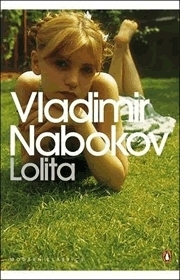Why is Lolita so often misunderstood?
 Humbert H's narrative is mindbending. He's writing Lolita (so he claims) from jail before execution, and he's writing it because 'I insist the world know how much I loved my Lolita, this Lolita, pale and polluted'. (He's describing her at 17, pregnant and well past the age at which he usually stops finding girls attractive.)
Humbert H's narrative is mindbending. He's writing Lolita (so he claims) from jail before execution, and he's writing it because 'I insist the world know how much I loved my Lolita, this Lolita, pale and polluted'. (He's describing her at 17, pregnant and well past the age at which he usually stops finding girls attractive.)
But that declaration comes close to the end, and given given his lyrical raptures over Dolores Haze's beauty, and the beauty of the nine to fourteen year old 'nymphets', a reader can't help but to try to figure out whether he's repentant, or is recommending paedophilia. Nabokov keeps us guessing while he plays plenty of word games: '…breakfast in the township of Soda, pop 1001'.
Many readers (including Martin Amis, if my edition's blurb is anything to go by – though I assume he was quoted out of context) do take it as the latter, an enconium to sex with young girls.
You'd have to read the book more than once to pick up all of Nabokov's games (for example, what's the significance of the amnesiac who turns up one morning in the hotel room of Humbert and his third wife Rita?). I'm too drenched with Nabokovness to return to it any time soon.
From the start Humbert comes off as a manipulative, self-indulgent, unbelievable narrator. For example, we're given to believe that due to his unresolved grief for childhood love Annabel, he has no choice but to fall for twelve-year-old Dolores Haze.
For most of the book I felt we could not know the 'real' Dolores at all, such was his bias. By his description, she's whiny, shallow and materialistic, has 'vacant eyes', an 'eerie vulgarity', and a 'nymphean evil breathing through [her] every pore'. (In his afterword, Nabokov himself refers to 'nymphets'.)
After her camp experience she is 'hopelessly depraved', with 'not a trace of modesty'. She has 'the body of some immortal daemon disguised as a female child'. (The cover of this edition upholds the idea that she was a precociously experienced and willing child. Sensationalist marketing, anyone?)
But Humbert / Nabokov also gives us plenty of evidence to stack against his claims. Again and again, Humbert describes his violence against Dolores, and her misery and reluctance ('…her sobs in the night – every night, every night – the moment I feigned sleep'). Relatively early in the book, after he first rapes her, he begins to develop a conscience: 'an opressive, hideous constraint as if I were sitting with the small ghost of somebody I had just killed'. In perhaps the saddest scene, he makes it clear that she only goes with him because 'she had absolutely nowhere else to go'.
As the book continues, Humbert often does not weave into the narrative retrospective regret for his actions and intentions. (Nabokov would never want to make it easy for us.) Therefore (for example) the not-too-discerning reader may believe that the narrator Humbert holds the same values as the earlier Humbert, who considered the virtue of marrying Dolores so she could produce another girl child for him, even resulting in a third-generation Lolita to play around with, or that the narrator Humbert thinks its fine that his earlier self forced a feverish Dolores to have sex with him, and had her masturbate him in her classroom while he ogled a schoolmate. (She must have had a very unobservant teacher.)
After the balance of power changes a little, his references to his conscience increase: 'I…hurt her rather badly for which I hope my heart may rot…'. Towards the end of the book he is explicit about his regret:
Unless it can be proven to me…that a North American girl-child named Dolores Haze had been deprived of her childhood by a maniac, unless this can be proven…I see nothing for the treatment of my misery but the melancholy and very local palliative of articulate art.
I believe him, I think.
This book reminds me of seeing Toni Morrison on Oprah a few years ago. Oprah said to Morrison that she loves her books but sometimes has to go back and reread a paragraph to figure it out. Morrison leaned forward and said 'Oprah, that's called reading'. Nabokov's sentences are pretty straightforward, but the contorted layers of consciousness in his narrative have consumed me for the last week. Reading as extreme sport.











